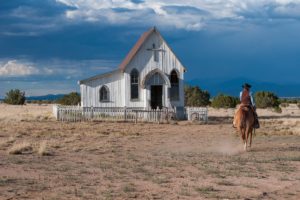Private Property
God created the universe with His spoken words. The creation story is outlined in the book of Genesis. That record reveals that God created the celestial and terrestrial order in six days. What is often missed is that God not only made dry land, oceans, birds, fish, beasts and mankind, He also created two powerful instincts during those six days, and implanted them in His image bearers, according to Genesis 1:28. God created the property instinct within Adam and Eve when He spoke the words “have dominion and subdue the earth.” God created the sexual instinct when He spoke the words “be fruitful and multiply.” Adam owned everything and temporarily enjoyed the simplest economic system on earth (total ownership), until granted the power to reproduce. With reproduction came the inescapable question “How do we divide up the property of earth in a fair and equitable way?” So the combination of the property instinct and the sexual instinct are inseparably connected and form the basis of sound Biblical economic theory.
Permitting those two instincts (property and sexual) to run wild, without limits, brought creation to ruin and forced God to kill the whole world through the Noahic flood of his wrath. Today the property instinct and the sexual instinct must remain balanced by God’s law or else they become every bit as destructive as it was leading up to the days of Noah. After the world-wide flood, Noah’s great grandchildren had incentive to honor the importance of dominion in line with God’s law. They knew what Christians uphold today: wealth, prosperity, and power must be tempered by the warning, “Thou shalt not steal” and “Thou shalt not covet.” Sex and fatherhood must be tempered by the warning, “Thou shalt not commit adultery” and “Thou shalt not covet.”
Abraham came into great wealth, prosperity and power by guarding his life through honesty and integrity in the stewardship of his property instinct. He was the polar opposite of a thief – he was a tither. Yet he was unable to have children. The promise of blessing upon mankind’s sexual instinct (created in Genesis 1:28) was unprecedented, so the inability of Abraham and Sarah to participate in it (barrenness) was equally staggering. Despite the fact that the misuse of the sexual instinct could bring a curse beyond comprehension, Sarah’s barrenness enticed the couple into sin. Abraham’s adulterous act with his mistress, Hagar, resulted in world-wide terrorism still haunting us to this very day. Yet Abraham finally found forgiveness and redemption by putting the principles of John 3:16 in action upside-down, and his willingness to give God his only son born from Sarah became the catalyst of our covenant through Jesus Christ, today. Said another way, “For Abraham so loved God he gave his only son” and “For God so loved the world He gave His only son.”
Abraham left dysfunctional dominion behind and by finally submitting both his sexual and property instincts, returned to the divine dominion God originally commanded in the Garden of Eden. The Biblical economic system is the only true economic system that can bring the nations, tribes and tongues of the world into true and full prosperity and peace. The necessary ingredients for God’s economy to flourish among men requires that we, too, leave dysfunctional dominion behind and submit our sexual and property instincts beneath the law of God.
Biblical economic system functions on the premise of five basic building blocks. It is through the use of these five building blocks that it is known that all people will be most prospered. The building blocks of simple Bible-based capitalism are listed as follows: 1) land; 2) labor; 3) capital; 4) private ownership and controls; 5) very little, if any, governmental interference.
Let us examine the issue of “land” in the Bible, for it is the first building block of the philosophy of capitalism. We must ask the questions, “What did Moses and Jesus (both mediators of a heavenly covenant) believe about land ownership?” Should men view land as a commodity that is “owned by the state” or the “really smart fellows?” Should citizens view themselves as “stewards” or “lessees” of the government, as the socialists proclaim? Or, in contrast to this view, should men view their land as something “owned by God,” while the inhabitants view themselves as “stewards” or “temporary owners” of something granted to them by its Creator? Moses writes:
“Speak unto the children of Israel, and say unto them, When ye come into the land which I give you, then shall the land keep a sabbath unto the Lord.” -Leviticus 25:2 (KJV)
A few verses later, Moses declares the temporary nature of land ownership, with regard to a man’s lifespan, when he writes:
“The land shall not be sold for ever: for the land is mine; for ye are strangers and sojourners with me.” -Leviticus 25:23 (KJV)
Along these lines, Adam Clark writes, “by this [verse, they were to] be put in mind of the necessity of having a permanent dwelling in the heavenly inheritance, and of that preparation without which it could not be possessed.” As to the concept of private ownership of property, Moses continues in the next passage:
“And in all the land of your possession ye shall grant a redemption for the land.” -Leviticus 25:24 (KJV)
New Unger’s Bible Dictionary states:
“Israel was taught that she had conquered Canaan only by the help of Jehovah (Psalm 44:3), and that the land was and remained the property of Jehovah, the covenant God (Leviticus 25:23). Though the land was promised to the children of Israel for an everlasting possession (Genesis 13:15-16), yet their retaining it was conditional on their faithful fulfillment of its covenant obligations (Leviticus 26:32-45; Deut. 4:26-30), and even the ground did not become Israel‘s property in such a way that the possessor could dispose of it as he willed.”
Moreover, Jesus endorsed the precedent of Hebrew law concerning private land ownership in His parable of the manager. It reads:
“Jesus told his disciples: “There was a rich man whose manager was accused of wasting his possessions. So he called him in and asked him, ‘What is this I hear about you? Give an account of your management, because you cannot be manager any longer.’” -Luke 16:1-2 & 11: (NIV)
At the conclusion of this story, given for the purpose of teaching men to rid themselves of laziness and complacency, Jesus instructs men to use adversity as a stimulus for creative, industrious, economic survival. The story crescendos with a concluding question for the lazy manager:
[11]“So if you have not been trustworthy in handling worldly wealth, who will trust you with true riches?
Then there was the parable of the vineyard owner who leased his land to a caretaker before embarking on a long journey. This begs the question, “How does one lease to others what one does not own?” It reads as follows:
“Then began he to speak to the people this parable; A certain man planted a vineyard, and let it forth [leased it] to husbandmen, and went into a far country for a long time.” -Luke 20:9 (KJV) (Emphasis added.)
“Hear another parable: There was a certain householder, which planted a vineyard, and hedged it round about, and digged a winepress in it, and built a tower, and let it out [leased it] to husbandmen, and went into a far country.” -Matthew 21:33 (KJV) (Emphasis added.)
With regard to private property ownership, the Bible goes so far as to warn those who would abuse this privilege through the sin of monopoly. The prophet Isaiah warns:
“Woe unto them that join house to house, that lay field to field, till there be no place, that they may be placed alone in the midst of the earth!” -Isaiah 5:8 (KJV)
Clearly, one with a biblical world-view, who considers both Old Testament law and New Testament instruction from the parables of the Lord Jesus, must believe in: 1) private ownership; 2) personal responsibility; and 3) diligent hard work. More specifically, we Christians are obliged to acknowledge that the basic tenets of capitalism are the most biblical of their counterpart, socialism. In defiance to this biblical view of economics, socialism:
“requires that the state abolish private ownership of the means of production, such as land and industrial plants, and replace them with ‘public [state] ownership and control’.” (Source: Encyclopedia International, Volume 6, Copyright 1963, Grolier Inc.)
In summary, the origin of the Christian pro-capitalism position is grounded on divine authority and the belief that God is the owner of this earth, and therefore, has the right to give it to whom He wills, without any interference on the part of those who would attempt to usurp and replace Him with either themselves or their economic theories.
James Madison, one of America’s noblest founders, nicknamed the “Father of the Constitution,” said,
“[It] is not a just government, nor is property secure under it, where arbitrary restrictions . . . deny to part of its citizens [the] free use of their facilities.”
In an article entitled Bank to Sheriff of Nottingham: ‘Keep your money!’, Douglas Minson writes:
“According to Justice O’Connor, the U.S. Supreme Court decision in Kelo v. New London could go down in history as one of the Court’s most infamous. If the preemptive response of one of the potential beneficiaries of the decision is any indication, she may well be right.
“In her emphatic dissent, joined by Chief Justice Rehnquist and Justices Scalia and Thomas, soon-to-depart-the-Court Justice O’Connor argued that the majority opinion in Kelo undermines the integrity of the Fifth Amendment by eliminating “any distinction between private and public use of property” and would as a result allow governments to take from the poor to give to the rich almost indiscriminately:” Any property may now be taken for the benefit of another private party, but the fallout from this decision will not be random. The beneficiaries are likely to be those citizens with disproportionate influence and power in the political process, including large corporations and development firms.”
“In a remarkable display of willingness to think without reference to crass self-interest, BB&T (the country’s 9th largest bank) this week declared its intention not to be the beneficiary of any local governments choosing to play the Sheriff of Nottingham. In explaining the decision, BB&T CEO and Chairman said, “The idea that a citizen’s property can be taken by the government solely for private use is extremely misguided, in fact it’s just plain wrong… As an institution dedicated to helping our clients achieve economic success and financial security, we won’t help any entity or company that would undermine that mission and threaten the hard-earned American dream of property ownership.
“Now that’s a business philosophy that families can appreciate.” (Source: Published by the Family Research Council, January 27, 2006, at www.frc.org)
One year later, on the anniversary of this errant and unconstitutional ruling against private property ownership, President Bush (R) struck back by issuing an executive order:
“By the authority vested in me as President by the Constitution and the laws of the United States of America, and to strengthen the rights of the American people against the taking of their private property, it is hereby ordered as follows: Section 1. Policy. It is the policy of the United States to protect the rights of Americans to their private property, including by limiting the taking of private property by the Federal Government to situations in which the taking is for public use, with just compensation, and for the purpose of benefiting the general public and not merely for the purpose of advancing the economic interest of private parties to be given ownership or use of the property taken.”
Some reports reveal that nearly 6,000 properties nationwide are either under threat, or have been taken since the Kelo decision. This is an error of terrific proportions that strikes at the heart of one of the single greatest pillars of American free society. In a televised appearance in August of 2005, Dr. James Dobsen stated:
“The…egregious decision in June, the Kelo case, essentially stripped away protection for property rights, which is one of the foundations of a free society. And indeed here again, a Wall Street Journal poll indicated on July 15 that the legal issue that people care about above all other issues right now, including even the sanctity of human life, was private property rights.
“But again, who cares? Their wishes have been overridden by the supremes. There just seems to be no limit to where the majority on this Court is going to take us. And more and more frequently now, they are drawing their inspiration from leftist influences in Western Europe. And they are being guided not by the United States Constitution or by legal precedent, or by American opinion. They are admitting this. They are being guided not by the law in Western Europe, but by opinions expressed in that most liberal area of the planet. And they call that democracy? I think not. If anything it’s an oligarchy. It’s a government by the few. And the Constitution does not envision that.”
Why should the issue of private property be extremely important to us as citizens? Why did Moses sculpt the precedent, Jesus sanction the model, and the founding fathers establish the actuality? Why did the founders believe private property ownership was paramount to the existence of a free society? There is an answer, and that answer reveals the unparalleled danger of Kelo v. New London, as well as the rogue court that created it.
Rose Wilder Lane said it so well,
“When Madison wrote, ‘the rights of property,’ everyone knew what he meant. The right to property was the essence of the Revolution; it was a right that Americans were fighting to establish. The fantastic notion that property rights can be opposed to human rights had never entered anyone’s head. That notion today is part of the confusion of American vocabulary and American thinking.”
Lane continues,
“This right had never existed. No individual owns property in communism. No one owned property under the ancient absolute monarchs. No one owned property in Athenian democracy, where everyone’s property and life were at the mercy of the majority’s whim. The church maintained the theory of private property as Church doctrine, as it maintained the equality of souls; for a right to own property is essential to individual freedom, and The Church recognized the freedom (the self-controlling responsibility) of souls, in abstract theory. But no one actually owned property in the feudal system… Americans were fighting for a right to own property.
“Individual ownership of property was a daring aim of the Revolutionary War…Nothing can take his natural rights from any living person. But without legal protection of those rights, no one can exercise them…Legal rights, when they exist, protect the individual’s EXERCISE of natural rights…American revolutionists were the first to see the simple fact that no man can use his natural freedom, if he has no right to stand upon this earth.”(Source: Rose Wilder Lane, The Discovery of Freedom, Page 183-184 © 1943)
So Moses sculpted the precedent of private property ownership, Jesus sanctioned the New Testament model, the ancient Christian church maintained the doctrine, the colonial revolutionists recognized its perfect beauty, and the founding fathers established its actuality. If it be true that freedom of religion is the cornerstone of the American dream, then it is also true that the legal right to own property rests most directly upon that stone.
The socialist world-view attacks the legal right to own private property as aggressively as it does the freedom of religion. Why? Because socialism:
“requires that the state abolish private ownership of the means of production, such as land and industrial plants, and replace them with ‘public [state] ownership and control’.” (Source: Encyclopedia International, Volume 6, Copyright 1963, Grolier Inc.)
The class-envy rubbish from the socialist left presents a misleading view of their attempt to destroy private property ownership. Cloaked in the deceitful portrayal of “an attack against the rich” by suggesting that “human rights are more important than property rights”, the socialists slowly chip away at the very bastion of hope upon which human rights rest – property rights.
Property rights are NOT the enemy of human rights! The right to own property is the greatest safeguard of a human being’s personal security and his exercise of natural “inalienable” rights. We must fight to secure the legal right to own private property. We must preserve it from the socialist influence of the leftist elites who have overcome the Democratic Party and threaten to slowly destroy the Grand Ole Party (as the proverbial Pied Piper beckons the right to join the left in the “responsible” middle).
A biblically accurate conservative world-view shall always place a premium upon the treasure of private property ownership – a concept planted in the pages of our Bible thousands of years ago, whose virtues were only realized a little more than 200 years ago.
“[It] is not a just government, nor is property secure under it, where arbitrary restrictions… deny to part of its citizens [the] free use of their facilities.” – James Madison
Tag:government, private property, rights





